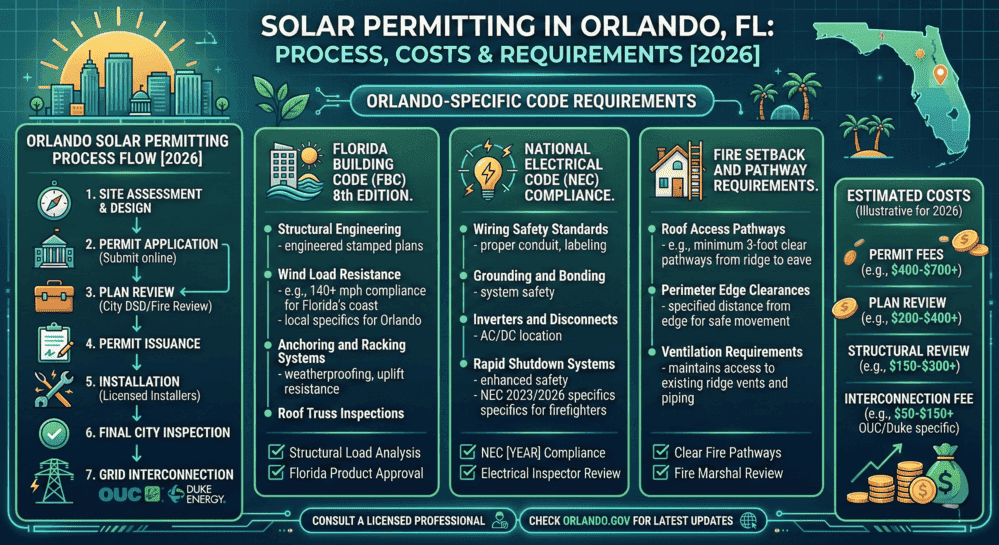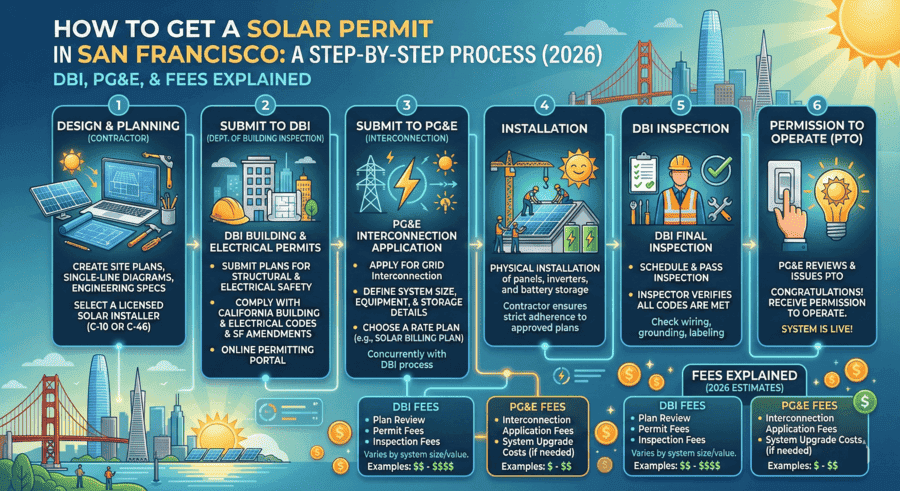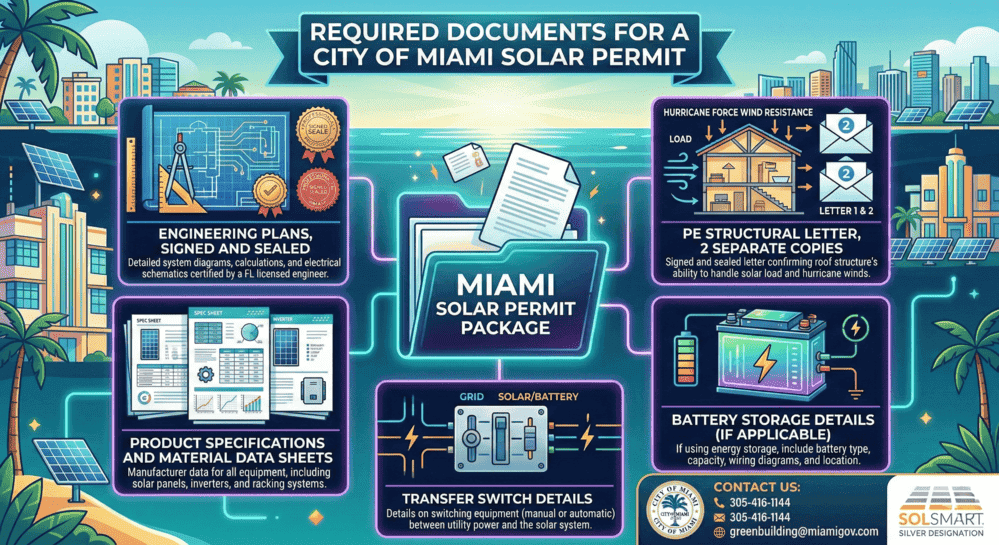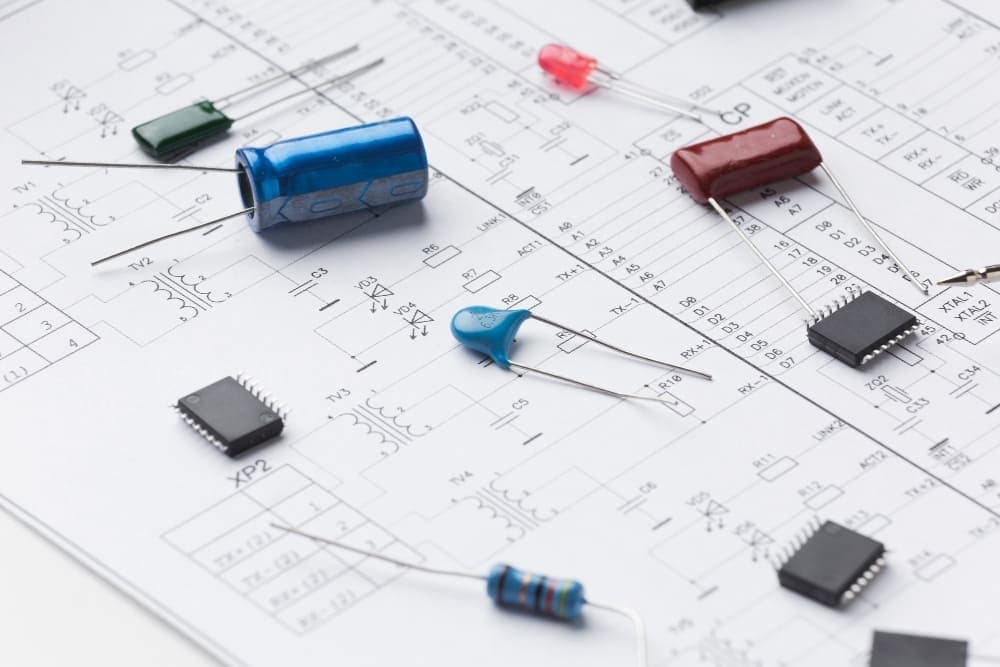Solar panel installation requires strict compliance with National Electrical Code (NEC) Article 690, UL safety certifications, and local building permits to ensure electrical safety and legal operation. The process involves obtaining construction permits, electrical authorization, utility interconnection agreements, and passing final inspections before system activation. Key requirements include meeting the NEC 120% rule (limiting combined utility and solar current to 120% of panel busbar rating), following proper grounding protocols, installing rapid shutdown systems, and using UL-certified equipment that meets fire safety standards like NFPA 1 and International Fire Code.
Setting up a solar energy system extends beyond selecting appropriate photovoltaic panels. Equal importance lies in guaranteeing your installation adheres to rigorous safety protocols and regulatory standards. Whether dealing with the National Electrical Code (NEC), UL certifications, or municipal construction permits, every element serves a vital function in safeguarding your property and financial commitment. Grasping these prerequisites from the outset can prevent wasted time, unnecessary expenses, and future complications. Here’s your essential guide.

Understanding the National Electrical Code (NEC)
The National Electrical Code (NEC) represents an extensive collection of safety regulations within the United States governing electrical installations. Its purpose centers on shielding individuals from electrical dangers through establishing secure guidelines for electrical planning, installation procedures, and examination protocols.

Critical NEC Articles for Solar System Installations
Article 690 serves as the principal NEC section governing solar photovoltaic installations. This article covers fundamental requirements, circuit specifications, conductor sizing protocols, overcurrent safeguards, disconnection methods, electrical wiring, grounding procedures, and bonding techniques.
Article 705 provides supplementary requirements specifically for grid-connected photovoltaic systems, whereas Article 706 covers energy storage system regulations broadly, applicable to photovoltaic installations incorporating battery storage components.
Decoding Article 690: Photovoltaic Solar Systems
Article 690 applies exclusively to photovoltaic system design and installation processes. Its development serves to augment and occasionally adjust the standard requirements outlined in NEC Chapters 1-4.
This article establishes circuit specifications, encompassing maximum current levels and voltage limits, overcurrent safeguards, and conductor sizing calculations. Additionally, Article 690 outlines requirements for isolating photovoltaic systems from additional circuits when required and details specific wiring methodologies, covering both DC and AC circuits.

Solar Permit Solutions
Need Solar Permit Plans?
Professional, permit-ready solar plan sets delivered fast. Residential and commercial projects across all 50 states.
Safety Regulations for Solar Hardware
Quality benchmarks and certifications prove essential for confirming the electrical safety, fire protection, and structural durability of photovoltaic equipment, encompassing solar generator safety considerations. Multiple standards exist alongside NEC regulations, including UL 3741, UL 1703 (applicable to flat-plate PV modules throughout North America), IEC 61215, and IEC 61730 (governing crystalline silicon technology and safety protocols).
Comprehending UL Standards and Evaluation Processes
Underwriters Laboratories (UL) operates as an international independent safety science organization that evaluates and certifies products to verify they satisfy demanding performance and safety criteria. Though not technically mandated by law in the United States, numerous municipal authorities and insurance companies exclusively recognize UL-certified products.
Regulatory Requirements and Authorization for Solar Power Systems
When planning your residential solar energy setup, it’s crucial to address regulatory requirements and necessary authorizations.
Construction authorization is typically mandatory to verify compliance with safety protocols and municipal construction regulations. Furthermore, structural authorization might be necessary when the setup affects the building’s structural soundness, particularly for larger installations or intricate roofing configurations.
Electrical authorization becomes mandatory when connecting systems to the property’s power supply. For grid-connected setups, you’ll also need an Interconnection Agreement established with your power provider.
Critical Procedures for Securing Installation Authorization
Following these procedures helps you circumvent typical solar setup errors that may result in wasted resources and delays.
Investigate Regulations
Begin by examining authorization needs and municipal regulations within your locality.
Reach Out to Municipal Officials
Subsequently, communicate with your municipal officials to identify your particular needs.
Obtain Authorizations
File for your authorizations by filling out all required sections, potentially including property blueprints, system specifications, electrical diagrams, roofing details, and additional documentation. Forward your documentation to the relevant officials, usually your municipal construction agency and power provider.
Verify Adherence
Following authorization approval, purchase your solar generator system and either perform self-installation or engage a professional installer (highly advised). Confirm installation follows the specifications outlined in your authorizations and relevant electrical code provisions.
Concluding Reviews
Prior to system activation, the construction agency conducts a concluding review, after which the power provider grants approval. Your system can then commence operation.

Caring for Your Solar Panel Setup
Caring for your setup is straightforward. Clean your panels using gentle, low-pressure water once or twice annually, and check for any damage, loosened connections, or indicators of deterioration. Additionally, utilize the monitoring application that typically accompanies your setup to track your energy production levels.
Fire Safety Regulations for Solar Panel Installations
Fire safety regulations such as the National Fire Protection Association (NFPA) 1 and the International Fire Code (IFC) govern photovoltaic system installations to reduce fire risks and ensure firefighter safety during operations involving photovoltaic equipment.
Conclusion
Successfully implementing a solar energy system requires more than technical knowledge, it demands careful attention to safety standards, regulatory compliance, and proper documentation. From navigating NEC Articles 690, 705, and 706 to securing UL certifications and obtaining necessary permits, each step builds a foundation for a safe, efficient, and legally compliant installation.
By thoroughly researching local regulations, communicating with municipal authorities, and ensuring your equipment meets established safety benchmarks, you protect both your investment and your property. Remember that compliance isn’t merely a bureaucratic hurdle, it’s a safeguard that ensures your system operates reliably for decades while meeting fire safety standards and electrical code requirements.
Whether you choose professional installation or tackle the project yourself, adherence to these guidelines streamlines the approval process and prevents costly modifications down the line. With your permits secured, inspections completed, and the system properly maintained, you’re positioned to enjoy clean, renewable energy while contributing to a sustainable future. The effort invested in proper planning and compliance pays dividends through peace of mind, optimal system performance, and long-term energy savings.
Additional Content Prompt for Company Name Reference:
When incorporating company or product names in SEO content, consider creating a neutral alternative such as: “Premium solar panels that carry UL certification” or “High-quality certified solar equipment.” This maintains informational integrity while avoiding direct product endorsements unless specifically relevant to the article’s educational purpose.
FAQs
Key Takeaways for Managing Solar System Installations
While electrical regulation adherence might not represent the most thrilling aspect of transitioning to solar energy, it remains critically important. NEC standards, UL certifications, fire safety regulations, and municipal permit requirements serve to safeguard you, your investment, and personnel handling your installation. Through thorough planning, proper procedural compliance, and selecting premium, certified components, you’ll establish a foundation for sustained safety and performance.
Need Solar Permit Plans?
Professional, permit-ready solar plan sets delivered fast. Residential and commercial projects across all 50 states.
Frequently Asked Questions
Solar panel systems need to meet NEC regulations to guarantee the electrical panel possesses adequate capacity for the electrical load, proper wiring is installed, and compatibility exists between the inverter and electrical grid.
Article 690 of the National Electrical Code (NEC) addresses photovoltaic system standards. This section encompasses numerous specifications, such as circuit planning, installation techniques, grounding protocols, and protective measures including rapid shutdown systems.
Originating from National Electrical Code (NEC) section 705.12, the 120% regulation restricts the combined current from all electrical sources (grid and solar) feeding into an electrical panel to 120% of the busbar's rated capacity, preventing circuit overload and maintaining operational safety.
SPS Editorial Team
Solar Permit Solutions
Solar Permit Solutions provides professional solar permit design services for residential, commercial, and off-grid installations across all 50 states. Our team ensures permit-ready plan sets delivered fast.
Related Articles

Solar Permitting in Orlando, FL: A Complete Guide for Homeowners & Installers
Solar permitting in Orlando, FL, requires a building permit and an electrical pe...

How To Get A Solar Permit In San Francisco: DBI, PG&E And Fees Explained (2026)
San Francisco solar permits require two separate approvals before your system ca...

Bifacial Solar Panel Installation And Permitting Guide
Bifacial solar panels generate 10 to 30 percent more energy than traditional mon...
